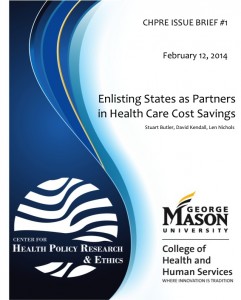Posted by CHPRE Staff
Center Activities, Hot Topics, Issue Briefs
Friday, September 19th, 2014
September 19, 2014. In this second Issue Brief of the new CHPRE series, Len Nichols, Director of the Center for Health Policy Research and Ethics, explains an essential but sometimes overlooked history of the Any Willing Provider and Freedom of Choice Laws and then reviews the arguments and evidence for and against them. In the end, Nichols offers conclusions for both sides to consider as the policy debate moves forward, or backward, or in circles, as the case may be.
Posted by CHPRE Staff
Latest News, Presentations
Thursday, September 11th, 2014
Len Nichols conducted a Virginia Medicaid Webinar , Tracking Revenue Flows of the ACA for Virginia, on September 9th, for the Virginia Health Information Network (VHIN).
The VHIN is an online learning community administered by the Virginia Center for Health Innovation. You must join in order to access the webinar, which is free.
Creating a profile takes just a few minutes. Once you are logged in to the Network, you can access the webinar page via the “Announcements” section at the top of your member home page, or under “Learn” in the top navigation. To join click
here
Posted by CHPRE Staff
Newsroom, Presentations
Wednesday, June 4th, 2014
Dr. Taylor-Clark, Senior Advisor for the Center for Health Policy Research and Ethics, took part on a panel presenting The Transforming Health System at the Public Health Services Research (PHSR) Interest Group meeting in San Diego. PHSR is part of the AcademyHealth Annual Research (ARM) Meeting being held June 8- 10th in San Diego.
Click here for presentation information.
Find PHSR Interest Group info here: 2014 Public Health Systems Research Interest Group Meeting
Posted by CHPRE Staff
Presentations
Wednesday, April 9th, 2014
7M enrolled doesn’t guarantee health law’s success
WASHINGTON (AP) — By RICARDO ALONSO-ZALDIVAR, Associated Press | April 5, 2014 | Updated: April 7, 2014 5:44am
Seven million people signed up, so there is an appetite for President Barack Obama’s health care law, but that doesn’t guarantee success for the country’s newest social program Republican opponents of the law keep pushing for a repeal, but as millions of people obtain insurance, how long can the party’s strategy remain a politically viable option? The source of the pent-up demand that propelled health care sign-ups beyond expectations could stem from the nation’s new economic reality: a shrinking middle class and many working people treading water in low-paying jobs. With fewer jobs these days that provide health benefits, there was an opening for a government program to subsidize private insurance. When Medicare and Medicaid were created in the 1960s, policymakers took it for granted that people working steady jobs would have access to health care, said Len Nichols, director of the health policy center at George Mason University in Virginia. [...]
Posted by CHPRE Staff
Hot Topics, Hot Topics, Issue Briefs, Policy Debates
Wednesday, February 12th, 2014

In this first Issue Brief of the new CHPRE series, Stuart Butler of the Heritage Foundation, Dave Kendall of Third Way and Len Nichols of CHPRE explain why and how policy makers can create incentives for states to engage private and federal stakeholders in health care cost containment activities that need to be jumpstarted, but likely will not without state engagement.
Posted by CHPRE Staff
Presentations
Thursday, February 6th, 2014
Len Nichols, Director for the Center for Health Policy Research and Ethics, served as a panelist at the AcademyHealth’s inaugural National Children’s Health Policy Conference in Washington, DC. on February 5th. Dr. Nichols joined other health policy leaders from across the country as a member of the panel entitled, “Child Health Coverage: What Will the Future Hold?” This panel examined an overview of the latest data on coverage trends, the status of CHIP and Medicaid, and early results from health insurance exchange enrollment.
Some of Dr. Nichols’ ideas were very well received during this session, even being tweeted by @AcademyHealth:
· RT @smithcass: Can we lower cost trajectory? If we don’t, we can’t maintain consensus for universal coverage @LenMNichols #CHPC14
· Be willing to be creative & think about diff ways we can maintain this commitment & make sure our families stay strong @LenMNichols #CHPC14
And, was even rated as one of the Top Influencers of #CHPC14 by Symplur Hashtags @healthhashtags! Other topics discussed and presented at the NCHPC included opportunities and threats to child health insurance, the CHIPRA national evaluation findings, systems of care for children at the state and local level, new research tools and data to inform child health policy, and child health equity. For more information on NCHPC sessions and presentations, check out AcademyHealth’s blog.

Posted by CHPRE Staff
Presentations
Monday, December 16th, 2013
The event was sponsored by the nonpartisan Alliance for Health Reform and The Commonwealth Fund. Panelists talked about both long-term overall health care spending and spending on programs such as medicare. They also proposed solutions for slowing down spending on both. Watch C -Span video
Friday, December 13, 2013 - Alliance for Health Reform
Despite slower health care spending growth over the last few years, long-term forecasts for overall health spending – and for public programs like Medicare – signal continuing concern.
The idea behind numerous recent proposals is to find lasting solutions, and some areas of consensus are beginning to emerge.
Many proposals recommend paying for value instead of volume through such delivery models as patient-centered medical homes and accountable care organizations. Some encourage improvements in market competition, by instituting competitive bidding and increasing the availability of information. There is also some agreement on establishing spending targets.
Which proposals can garner support from various policymakers and stakeholders? How much money would these proposals save and what would be their effect on quality of care? What would it take to get the ball rolling on consensus proposals, and what are the challenges to widespread adoption?




